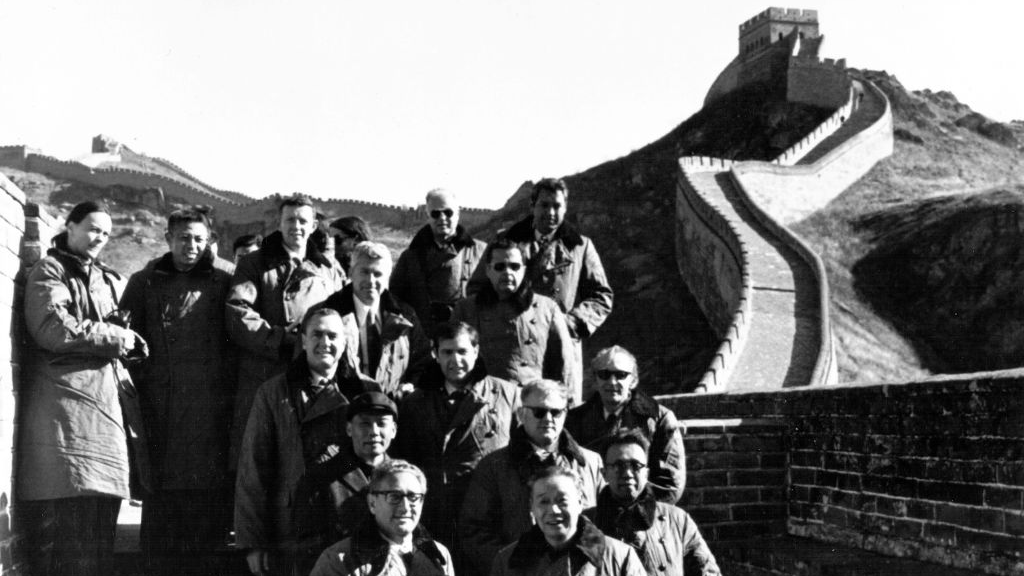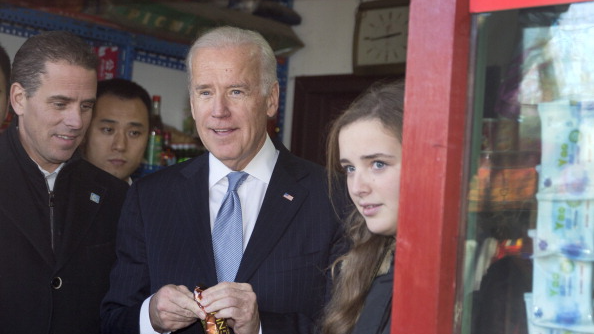
Members of the U.S. delegation pose with Chinese hosts on the Great Wall, Beijing, China, October 22, 1971. /Getty
Members of the U.S. delegation pose with Chinese hosts on the Great Wall, Beijing, China, October 22, 1971. /Getty
Editor's note: Tao Wenzhao is a senior research fellow at the Institute of American Studies, Chinese Academy of Social Sciences. The article reflects the author's views and not necessarily those of CGTN.
At the grand old age of 98, Dr. Kissinger still has his mind on China-U.S. relations and constantly shares his insightful views in this regard, both showing deep concern and sending out awakening alarms. After last year's U.S. general election, he has done several interviews with the media. A few of his views are particularly impressive.
First, when asked to comment on the initial thawing of relations between China and the U.S., Kissinger said, with firm belief, that the opening to China was a significant contribution to the world order, and that a wholesome adjustment of bilateral ties, which had evolved for 50 years, required wisdom on both sides. In a modern global system, he noted, the concepts of dominant and subordinate states would no longer work.
Second, on China's rejuvenation, Kissinger said nothing surprising about it as the country had been a great power across different historical periods over thousands of years. Nevertheless, he also mentioned that as a result of China's rejuvenation, the U.S. would have to, for the first time in history, deal with a country that was not just almost an economic equal, but also good at handling global affairs. In this sense, framing the right approach to China will be a great challenge for the United States.
Third, while asked about his views on the ideological differences between the two countries, Kissinger recalled the situation when the decision was made to normalize bilateral relations, saying that neither President Nixon nor he believed China's ideology would inevitably change as a result of the reconciliation. The real question in the future, he pointed out, would be about the extent to which ideological differences affect bilateral relations.

Then U.S. Vice President Joe Biden (C) buys an icecream at a shop as he tours a Hutong alley with his granddaughter Finnegan Biden (R) and son Hunter Biden (L) in Beijing, China, December 5, 2013. /Getty
Then U.S. Vice President Joe Biden (C) buys an icecream at a shop as he tours a Hutong alley with his granddaughter Finnegan Biden (R) and son Hunter Biden (L) in Beijing, China, December 5, 2013. /Getty
In his toast at a banquet honoring the Chinese Premier during his China visit in February 1972, Nixon said, "You believe deeply in your system, and we believe just as deeply in ours. It is not our common beliefs that have brought us together here, but our common interests and our common hope…" This is in line with Kissinger's remarks. On what the Biden administration said about building an anti-China coalition of democracies, Kissinger said it was unwise to form a coalition against any country.
Fourth, Kissinger criticized Trump's excessive use of a maximally confrontational negotiation method and expressed his deep concern over the free fall of China-U.S. relations during the Trump years. Holding that the world should not slip into where it was prior to World War I, he believed that if China and the U.S. were allowed to be locked in an unchecked escalation of tensions, the world would descend into a disaster comparable to World War I.
Fifth, to avoid a disaster like this, Kissinger expressly said that he was "not in favor of a crusade against China," and that the U.S. should willingly accept coexistence. The two countries, he noted, should not seek to crush each other while pursuing their own values and goals, but put coexistence above dominance.
To this end, they needed to set positive objectives and abandon containment narratives, establish a mechanism between trusted representatives on the two sides to maintain high-level contacts, look for opportunities to cooperate – for example, those arising from the battle against COVID-19, and not perpetuate confrontation using modern technologies.
It is hoped that American decision-makers will heed Dr. Kissinger's warnings and advice and draw wisdom from them to avoid further U.S.-China confrontation, as well as the suffering it might subsequently inflict on the two countries and the rest of the international community.
Hear the words of the wise: On the 50th anniversary of Kissinger's trip to China (Part I)
(If you want to contribute and have specific expertise, please contact us at opinions@cgtn.com.)

